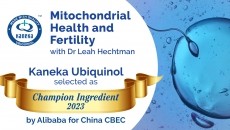Study doubts antioxidant benefits for heart risk women
realise any benefit from taking antioxidant vitamins C, E or beta
carotene, concludes a major study - but nor are they likely to
suffer any harm.
The study, conducted by researchers at the Brigham and Women's Hospital and Harvard Medical School in Boston, is the latest to cast doubt on the efficacy of antioxidants for health. For instance in the past questions have been levelled at vitamin E following negative conclusions, which have affected supplement and ingredient sales. However this new study may not have a major impact on the supplements category if it is bourn in mind that it was conducted on women who had already had a history of heart disease or who suffered from three or more risk factors (self reported hypertension, high cholesterol, diabetes mellitus, parental history of heart attack before the age of 60, obesity, and current cigarette smoking). This means that caution should be applied in extrapolating the results to a wider demographic. The researchers initiated the study since they said randomized trials have largely failed to support an effect of antioxidant vitamins on the risk of cardiovascular disease - even though diets with a high intake of fruit and vegetables have been linked to reduced rates of coronary heart disease and stroke. "Few trials have examined interactions among antioxidants, and, to our knowledge, no previous trial has examined the individual effect of ascorbic acid (vitamin C) on CVD," they wrote. Dubbed the Women's Antioxidant Cardiovascular Study, it followed 8,171 women who were aged 40 years or over (average age 60.6 years) in 1995-6 and met the conditions of high cardiovascular risk. The women were randomly assigned to take 500mg of ascorbic acid or a placebo every day; 600 international units of vitamin E or a placebo; or 50mg of beta carotene or a placebo every day. Over the average study period of 9.4 years, 1,450 of the women experienced one or more cardiovascular event. Between them there were 274 hear attacks, 298 strokes, 889 coronary revascularization procedures, and 395 cardiovascular deaths (600 women died of other causes). "There was no overall effect of ascorbic acid, vitamin E or beta carotene on the primary combined end point or on the individual secondary outcomes of myocardial infarction, stroke, coronary revascularization or cardiovascular disease death," wrote the researchers. The no benefit conclusion holds both for the antioxidants taken alone or in combination. Neither, however, was any harm observed. "While additional research into combinations of agents, particularly for stroke, may be of interest, widespread use of these individual agents for cardiovascular protection does not appear warranted," they concluded. In particular they said that questions concerning the complex nature of dietary effects on lipid peroxidation are deserving of further study. But the researchers also hypothesized that the discrepancies between most intervention trials and studies of fruits and vegetables could be down to single antioxidants not reflecting the complete and complex profile of vitamins and nutrients found in food. As to limitations of the study, these include "lack of complete follow-up and compliance". Reference: Journal: Annals of Internal Medicine 2007;167:1610-1618 Title: "A Randomized Factorial Trial of Vitamins C and E and Beta Carotene in the Secondary Prevention of Cardiovascular Events in Women - Results From the Women's Antioxidant Cardiovascular Study." Authors: Nancy R Cook, ScD; Christine M Albert, MD; J Michael Gaziano, MD; Elaine Zaharris, BA; Jean MacFadyen, BA; Eleanor Danielson, MIA; Julie E Buring, ScD; JoAnn E Manson, MD, DrPH











